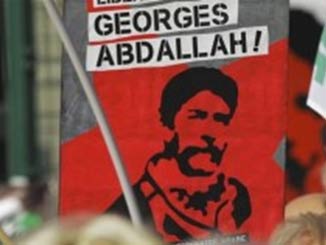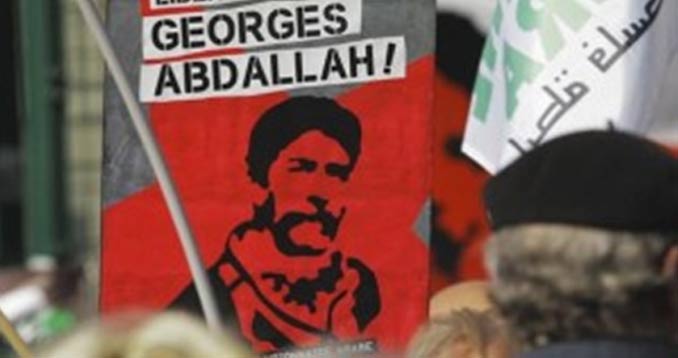

Buses are filling up from across France for the annual march on Saturday, 22 October, in Lannemezan, where imprisoned Lebanese Communist struggler for Palestine Georges Ibrahim Abdallah is held. The march will progress from the train station in Lannemezan to the prison, where participants will ensure their voices are heard inside, demanding freedom for Georges Abdallah and all prisoners of the Palestinian cause, and showing support and solidarity to the Palestinian people and their resistance in the liberation struggle. For over 10 years, this march has brought together hundreds and thousands of people to demand the release of Abdallah, jailed in France for 38 years.
The annual march marks the anniversary of his arrest on 24 October 1984, demanding his liberation and return to his homeland Lebanon, which has been repeatedly denied despite multiple judicial and political victories. This year, it will take place on Saturday, 22 October at 2 pm, marching from the train station in Lannemezan to the prison.
In Toulouse, the Collectif Palestine Vaincra, a member organization of the Samidoun Network, is organizing a free bus to Lannemezan, leaving at 11:30 am from the Basso Cambo metro in Toulouse and returning in the evening. Participants may register by emailing collectifpalestinevaincra@gmail.com.
Group travel will also proceed from multiple cities throughout France. People may email campagne.unitaire.gabdallah@gmail.com for departures from Paris and liberonsgeorges33@riseup.net for departures from Bordeaux. Carpooling and buses from Marseille, Foix, Montauban, Saint-Girons and Pau are also being organized, with details and contact information at the Facebook event.
The evening before the demonstration, on Friday, 21 October, the Collectif will host an event in Toulouse linking the struggle for a liberated Palestine with the campaign to free Georges Abdallah. The event will take place at the Bourse du Travail, a labour union hall in Toulouse, at 7 pm.
Speakers will include Elsa Lefort, the wife of Salah Hamouri and the spokesperson of the committee urging the imprisoned French-Palestinian lawyer’s freedom; Pierre Stambul, of the French Jewish Union for Peace, a longterm struggler for Palestinian liberation, anti-racism and anti-colonialism; and Jaldia Abubakra, of Samidoun Spain and the Masar Badil, the Alternative Palestinian Revolutionary Path.
There is growing enthusiasm throughout France for the release of Georges Abdallah. On Friday, 7 October, two activists ran onto the field of Lyon Stadium during a football march, carrying Palestinian flags and t-shirts calling for Abdallah’s freedom. The widely televised and seen incident drew attention to the case, and the two activists were held for two nights in jail before being released.
A Lebanese Canadian professor is facing another extradition from France. Dr. Hassan Diab is a Canadian citizen and university professor, who until 2008 was living a productive and peaceful life in Ottawa, Canada. In 2008, he was arrested by the Royal Canadian Mounted Police (RCMP) at the request of France for alleged involvement in a bombing outside a Paris synagogue on 3 October 1980, which killed four people and wounded more than 40. Hassan has always denied any involvement in the crime, pointing out that this is a case of mistaken identity, and that he was a student in Lebanon at the time writing his exams.
After being held for almost five months in the Ottawa-Carleton Detention Centre, Hassan was released under onerous bail conditions, including virtual house arrest, and an electronic monitoring device for which he was required to pay $2,000 per month.
The extradition hearing in Canada ran from late 2009 until June of 2011. The hearing laid bare just how flimsy and baseless the case against Hassan is. Two handwriting analysis reports presented by France relied on samples that were not written by Hassan, and had to be replaced by a third handwriting analysis. Five world-renowned handwriting experts from Britain, Canada, Switzerland, and the United States testified that this third handwriting analysis report is biased, totally flawed, and utterly unreliable, and that an objective analysis points away from Hassan.
There is a complete lack of forensic evidence to support the case. The suspect had left finger and palm prints behind, none of which matched Hassan’s. Witness descriptions were also riddled with contradictions.
Moreover, the case against Hassan relies on secret, unsourced intelligence that may be the product of torture. The intelligence was withdrawn from the extradition hearing in Canada in recognition of its extremely problematic nature. However, the intelligence remains in the French dossier. Human Rights Watch has documented the use of secret intelligence and unfair trials under France’s anti-terrorism laws.
In committing Hassan to extradition, the Canadian extradition judge, Justice Robert Maranger, noted that the handwriting evidence (which was heavily criticized by the international handwriting experts) — and only this evidence — is grounds for committal. The judge described the handwriting evidence as “convoluted”, “very confusing”, and “with conclusions that are suspect”, but stated that Canada’s extradition law left him no choice but to commit Hassan. In his committal decision on 6 July 2011, Justice Maranger, wrote: o “the evidence that tips the scale in favor of committal is the handwriting comparison evidence.” (para. 189)
o “the case presented by the Republic of France against Mr. Diab is a weak case; the prospects of conviction in the context of a fair trial, seem unlikely.” (para. 191)
o “It is presupposed, based on our treaty with France, that they will conduct a fair trial, and that justice will be done.” (para. 195)
Hassan’s search for justice continued for three more years, including appeals in the Canadian court system. After the Supreme Court of Canada declined to hear his final appeal, he was swiftly extradited to France in November 2014. He was not given the opportunity to say goodbye to his wife (who was expecting their second child) and his 2-year old daughter.
Hassan was incarcerated in the Fleury-Mérogis maximum security prison on the outskirts of Paris. He spent the next 38 months there, in near solitary confinement. (International standards have determined that solitary confinement beyond 15 days constitutes cruel treatment and quite likely amounts to torture.)
Contrary to standard principles of extradition, no formal charges were laid by the French authorities prior to Hassan’s extradition. While he was in prison in France, the French investigative judges (“juges d’instruction”), Jean-Marc Herbaut and Richard Foltzer, continued the investigation of the decades-long case. On eight occasions the investigative judges ordered Dr. Diab’s release on bail. Eight times the state prosecutor (“procureur”) was successful in blocking his release.
Finally, in January 2018, the two investigative judges, having completed their investigation which included travel to Lebanon to interview witnesses, concluded that there were no grounds for pursuing a trial and ordered that Dr. Diab be immediately released. Two days later, Dr. Diab returned to Ottawa and rejoined his family, including his 3-year old son who was born soon after his extradition.
Meanwhile, the French prosecutors, urged on by political pressure and the victims’ lobby, appealed against the dismissal order (“ordonnance de non-lieu”) of the investigative judges. The French Court of Appeal ordered a new handwriting analysis which determined that the previous handwriting analysis, which was accepted by Justice Maranger, was inconclusive, used the wrong methodology, and was completely unreliable. The analysts indicated that they were in full agreement with Dr. Diab’s international handwriting experts. In spite of this and in a decision that shocks the conscience, the French judiciary set an April 2023 date for the trial of Hassan, more than five years after he was cleared of all accusations and freed without conditions by the French investigative judges.
If Hassan goes on trial in France, Hassan would be tried on unreliable and flawed evidence that he is not allowed to effectively challenge. The discredited handwriting analysis reports and unsourced intelligence remain in the dossier. Evidence introduced by his lawyers would not receive fair consideration because expert witnesses for the defense are viewed with suspicion by the court.

Leave a Reply